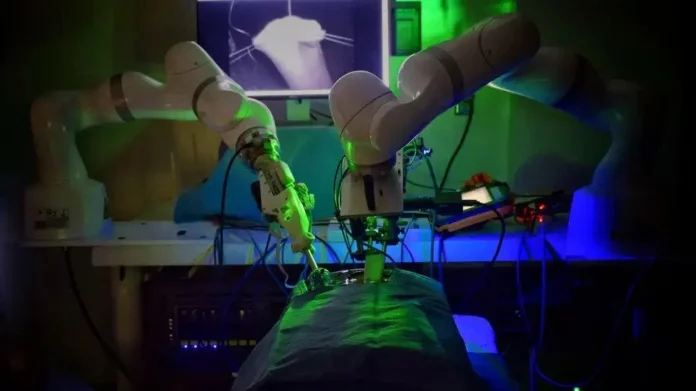The artificial intelligence boom is already beginning to penetrate the medical field in the form of AI-based visit summarization and patient analysis. A new study demonstrates how AI training methods similar to those used for ChatGPT can be used to teach surgical robots to perform independent surgeries.
Researchers from Johns Hopkins University and Stanford University built a training model using videos of human-controlled robotic arms performing surgical tasks. By learning to imitate the actions in the video, the researchers believe they will be able to reduce the need to program every single movement required for the procedure.
Of course, robotics has been used in the operating room for many years – back in 2018, the “grape surgery” meme highlighted how robotic arms can assist during surgeries by providing an increased level of precision. In 2020, about 876,000 robot-assisted surgeries were performed. Robotic instruments can reach places and perform tasks in the body where the surgeon’s hand can never reach, and they do not suffer from tremors. Thin, precise instruments can avoid damaging nerves. But robotics is usually manually operated by a surgeon using a controller. The surgeon is always in charge.
Skeptics of more autonomous robots fear that AI models such as ChatGPT are not “intelligent” but rather simply mimic what they have seen before and do not understand the basic concepts they are dealing with. The infinite variety of pathologies in countless people creates a problem: what if the AI model hasn’t seen a certain scenario before? Something can go wrong during surgery in a split second, and what if the AI is not trained to respond to it?
At the very least, autonomous robots used in surgery must be approved by the FDA. In other cases, when doctors use AI to summarize patient visits and make recommendations, FDA approval is not required, as it is technically assumed that the doctor reviews and approves any information they provide. This is a concern, as there is already evidence that AI bots can make poor recommendations or hallucinate and include information in meeting transcripts that was never spoken. How often will a tired, overworked doctor accept everything that artificial intelligence produces without checking it carefully?
This is reminiscent of recent reports of soldiers in Israel relying on AI to identify attack targets without checking the information very carefully. “Soldiers who were poorly trained to use the technology attacked human targets without any confirmation of [AI] predictions,” the Washington Post article says. “At some points, the only confirmation needed was that the target was male.” Things can go awry when people become complacent and not sufficiently aware of what’s going on.
Healthcare is another area with high stakes – certainly higher than the consumer market. If Gmail doesn’t summarize an email correctly, it’s not the end of the world. A much more serious problem is an incorrect diagnosis made by an artificial intelligence system or a mistake during an operation. Who is responsible in this case?
The idea that AI will ever be infallible is hard to take seriously when no technology is perfect. Sure, this autonomous technology is interesting from a research point of view, but the consequences of a botched operation by an autonomous robot would be enormous. Who do you punish when something goes wrong, who gets their medical license revoked? Humans are not infallible either, but at least patients can rest easy knowing that they have undergone years of training and can be held accountable if something goes wrong. AI models are crude simulacra of humans, behave unpredictably at times, and have no moral compass.
If doctors are tired and overworked – a reason why researchers believe this technology could be useful – perhaps the systemic problems that cause the shortage should be addressed instead. It has been widely reported that the United States is experiencing a severe shortage of physicians due to the growing inaccessibility of the field. According to the American Association of Medical Colleges, the country will be short 10,000 to 20,000 surgeons by 2036.









